Press Bureau of the Federation of Western Thrace Turks in Europe (ABTTF)-
Witten, 29 March 2005
Press Release:
The New Board was Elected at the Delegates’ Council of the Federation of Western Thrace Turks in Europe (ABTTF)
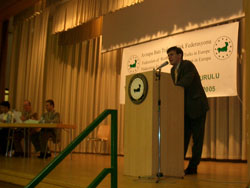
The Delegates’ Council of the Federation of Western Thrace Turks in Europe (ABTTF) assembled on the 27. March on Sunday in Giessen elected the names, who are going to take over the administration of the Federation in the 14. election term. While an entire support for the Turkish Union of Xanthi banned by the Greek Supreme Court of Appeal due to the word “Turkish” in its name came out at the Delegates’ Council, the principle decision was taken to bring the just claim of the Western Thrace Turks, who lost their citizenships due to the Art. 19 of the Greek Citizenship Law, in front of the European Court of Human Rights (ECHM).
The Delegates’ Council of the Federation of Western Thrace Turks in Europe (ABTTF) took place on the 27. March on Sunday in Giessen in Germany through the participation of 182 delegations from 24 foundations from Germany and England. This high participation to the Delegates’ Council on the level of foundations and delegates demonstrates that the Western Thrace Turks are resolute again after the hard repressions in the 70s and 80s to get their minority rights through having gained their citizenship rights in the last years.
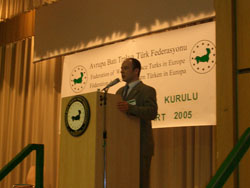
After the still moment dedicated to the memory of the leaders, who served the Western Thrace claim, the presidency of the council meeting was assigned unanimously to the first president of the Federation of Western Thrace Turks in Europe (ABTTF), Cafer Alioglu. The president of the Federation of Western Thrace Turks in Europe (ABTTF), Mr. Halit Hapioglu, who made the opening speech of the assembly, touched on the history and problems of the minority, and the struggle for the rights at the European level, and said: “The minorities are gaining now a great significance inside the European Union. Since they are an important part of the culture and the civilization, they have been taken under protection by the institutions of the European Union. It is also the same in Poland, the Czech Republic, Slovakia and Hungary, which have joined to the European Union recently. However, Greece, which is seen as the elder brother of these states in some respect, is a bad example for these new member states of the EU. Not only we, the Western Thrace Turks, but also all the minorities are under repression in Greece. We are in the exact middle of Europe, just by Brussels, Strasbourg, Haag and Zurich. Since we have these possibilities available to us, we should ask ourselves, what we could do. We should start the struggle for justice and right through using the opportunities of living in the middle of Europe.”
After the speeches of Irfan Dinc, the member of the executive board and general accountant of the Turkish-Islam Union of the Institution for Religion (DITIB), and Adulhalim Dede, the owner of the newspaper “Trakya’nin Sesi”, who participated to the assembly as guests, and reading of the support messages for the assembly came from the Western Thrace, Turkey and the other countries, the agenda subject matters were covered.
The Foundations Excluded from the Membership and the Membership Fees
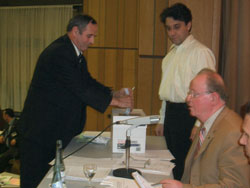
One of the most significant discussion points of the Congress was the status of the foundations, whose memberships had ended due to the not-payment of the membership fees. The foundations, which had paid their membership fees after the exclusion process, were accepted to the membership again by the Delegates’ Congress. After this amicable settlement of the dispute, upon the recommendation of the former executive board, it was decided to reduce the membership fees in order that such problems do not appear any more in the future. On the Congress, which ran in a general friendly atmosphere, there were also heated discussions. Once, the increasing tension could be overcome through the conciliatory speech of the DITIB-Representative Irfan Dinc.
Prize Ceremony for the Foundations
The Solidarity Foundations of Western Thrace Turks in Menschede, Schweinfurt, Gütersloh and Witten due to their big contributions to the campaign started by the ABTTF in order to support the restoration of the historical Okcular Mosque, which was burned down during the parliament elections in March in 2004 in Greece by unknown persons, and the Solidarity Foundation of Western Thrace Turks in Menschede due to its support for the help campaign in favour of the victims of the earthquake catastrophe in South-Eastern Asia were awarded in each case with a plaque.
Support for the “Turkish Union of Xanthi” and die Victims of the Art. 19
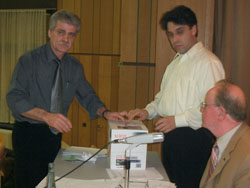
The “Turkish Union of Xanthi”, which was banned in the previous days by the Greek Supreme Court of Appeal due to the word “Turkish” in its name, has received comprehensive support from the ABTTF. In a declaration written by the Executive Board of the Federation, and approved on the Congress unanimously, the behaviour of Greece, which “denies the identity of the Turkish minority in Greece through this ban decision, but at the same time is proud of being a member of the European Union, and describes itself as the cradle of civilization”, was condemned. It was stated that it would be stood behind the Turkish Union of Xanthi at the forthcoming struggle on the European level, and said, “We condemn utterly that the Greek Supreme Court approved the ban decision of the Turkish Union of Xanthi. We call the Greek state upon to recognize officially the Turks, Macedonians, Albanians, Wlachs, Jews, Catholics, and all the other minorities living in Greece, and give them their rights arising from the European Union Law and the International Law.”
It was decided unanimously on the Congress that it would be acted in front of the European Court of Human Rights for the rights of the minority members, who had lost their citizenships due to the Art. 19 of the Greek Citizenship Law, which had been in force from 1955 till 1998, and harmed about 65 thousand Western Thrace Turks. The Art. 19, which was cancelled in 1998, had discriminated among the Greek citizens between “the ones from the Greek ethnicity” and “non-Greeks”, and gave the Greek public bodies the right to expatriate the non-Greek citizens, when they left the country. The article, as long as it was in force war, harmed even the members of the minority members, which did their military service in the Greek army. Although it was cancelled in 1998 due to the increasing foreign pressures, many minority members still live today in the “stateless status”, since the cancellation did not have a retrospective validity. On the Congress, the president Mr. Habipoglu introduced the project, which was worked out by the 13. Executive Board for this subject matter: He mentioned the firm intention of the Executive Board to bring the case in front of the European judicial instances, and received for that the unanimous support of the Congress.
Exciting Elections
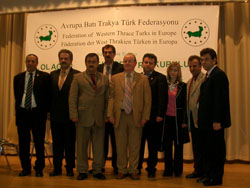
After the progress report of the executive board of the 13. term had been submitted, and the reports of the cashier and the auditor had been presented, the activities of the executive board of the 13. term were cleared by the Congress delegates unanimously, and it was proceeded with the elections of the executive board, the commissions of controlling and discipline for the 14. term. 24 candidates stood for the executive board. Halit Habiboglu, Zeynep Adem and Fahriye Sar were elected directly with more than half of the 180 votes in the first round of the election. After the second round, at which 162 votes were valid, 8 other names were decided: Mehmet Hüseyin, Engin Ahmet, Mustafa Kasap, Sebaytin Mümin, Sami Yusuf, Yavuz Cemali. Engin Ismail and Aydin Ahmet.
Saban Makaraci, Hüseyin Sar and Sükrü Ademoglu, who stood for the Discipline Commission, were elected by the Congress delegates unanimously, and for the Controlling Commission, Cengiz Ismail, Erol Hasimoglu and Sebahattin Hasan, who received the absolute majority of the votes, were elected. The new elected members of the executive board came together after the Congress, and announced that they would continue and improve the successful work of the executive board of the 13. term, and stand always and under every condition on the duty of the Western Thrace claim, and fellow citizens in the Western Thrace.
 The Delegates’ Council of the Federation of Western Thrace Turks in Europe (ABTTF) assembled on the 27. March on Sunday in Giessen elected the names, who are going to take over the administration of the Federation in the 14. election term. While an entire support for the Turkish Union of Xanthi banned by the Greek Supreme Court of Appeal due to the word “Turkish” in its name came out at the Delegates’ Council, the principle decision was taken to bring the just claim of the Western Thrace Turks, who lost their citizenships due to the Art. 19 of the Greek Citizenship Law, in front of the European Court of Human Rights (ECHM).
The Delegates’ Council of the Federation of Western Thrace Turks in Europe (ABTTF) assembled on the 27. March on Sunday in Giessen elected the names, who are going to take over the administration of the Federation in the 14. election term. While an entire support for the Turkish Union of Xanthi banned by the Greek Supreme Court of Appeal due to the word “Turkish” in its name came out at the Delegates’ Council, the principle decision was taken to bring the just claim of the Western Thrace Turks, who lost their citizenships due to the Art. 19 of the Greek Citizenship Law, in front of the European Court of Human Rights (ECHM). After the still moment dedicated to the memory of the leaders, who served the Western Thrace claim, the presidency of the council meeting was assigned unanimously to the first president of the Federation of Western Thrace Turks in Europe (ABTTF), Cafer Alioglu. The president of the Federation of Western Thrace Turks in Europe (ABTTF), Mr. Halit Hapioglu, who made the opening speech of the assembly, touched on the history and problems of the minority, and the struggle for the rights at the European level, and said: “The minorities are gaining now a great significance inside the European Union. Since they are an important part of the culture and the civilization, they have been taken under protection by the institutions of the European Union. It is also the same in Poland, the Czech Republic, Slovakia and Hungary, which have joined to the European Union recently. However, Greece, which is seen as the elder brother of these states in some respect, is a bad example for these new member states of the EU. Not only we, the Western Thrace Turks, but also all the minorities are under repression in Greece. We are in the exact middle of Europe, just by Brussels, Strasbourg, Haag and Zurich. Since we have these possibilities available to us, we should ask ourselves, what we could do. We should start the struggle for justice and right through using the opportunities of living in the middle of Europe.”
After the still moment dedicated to the memory of the leaders, who served the Western Thrace claim, the presidency of the council meeting was assigned unanimously to the first president of the Federation of Western Thrace Turks in Europe (ABTTF), Cafer Alioglu. The president of the Federation of Western Thrace Turks in Europe (ABTTF), Mr. Halit Hapioglu, who made the opening speech of the assembly, touched on the history and problems of the minority, and the struggle for the rights at the European level, and said: “The minorities are gaining now a great significance inside the European Union. Since they are an important part of the culture and the civilization, they have been taken under protection by the institutions of the European Union. It is also the same in Poland, the Czech Republic, Slovakia and Hungary, which have joined to the European Union recently. However, Greece, which is seen as the elder brother of these states in some respect, is a bad example for these new member states of the EU. Not only we, the Western Thrace Turks, but also all the minorities are under repression in Greece. We are in the exact middle of Europe, just by Brussels, Strasbourg, Haag and Zurich. Since we have these possibilities available to us, we should ask ourselves, what we could do. We should start the struggle for justice and right through using the opportunities of living in the middle of Europe.” One of the most significant discussion points of the Congress was the status of the foundations, whose memberships had ended due to the not-payment of the membership fees. The foundations, which had paid their membership fees after the exclusion process, were accepted to the membership again by the Delegates’ Congress. After this amicable settlement of the dispute, upon the recommendation of the former executive board, it was decided to reduce the membership fees in order that such problems do not appear any more in the future. On the Congress, which ran in a general friendly atmosphere, there were also heated discussions. Once, the increasing tension could be overcome through the conciliatory speech of the DITIB-Representative Irfan Dinc.
One of the most significant discussion points of the Congress was the status of the foundations, whose memberships had ended due to the not-payment of the membership fees. The foundations, which had paid their membership fees after the exclusion process, were accepted to the membership again by the Delegates’ Congress. After this amicable settlement of the dispute, upon the recommendation of the former executive board, it was decided to reduce the membership fees in order that such problems do not appear any more in the future. On the Congress, which ran in a general friendly atmosphere, there were also heated discussions. Once, the increasing tension could be overcome through the conciliatory speech of the DITIB-Representative Irfan Dinc. The “Turkish Union of Xanthi”, which was banned in the previous days by the Greek Supreme Court of Appeal due to the word “Turkish” in its name, has received comprehensive support from the ABTTF. In a declaration written by the Executive Board of the Federation, and approved on the Congress unanimously, the behaviour of Greece, which “denies the identity of the Turkish minority in Greece through this ban decision, but at the same time is proud of being a member of the European Union, and describes itself as the cradle of civilization”, was condemned. It was stated that it would be stood behind the Turkish Union of Xanthi at the forthcoming struggle on the European level, and said, “We condemn utterly that the Greek Supreme Court approved the ban decision of the Turkish Union of Xanthi. We call the Greek state upon to recognize officially the Turks, Macedonians, Albanians, Wlachs, Jews, Catholics, and all the other minorities living in Greece, and give them their rights arising from the European Union Law and the International Law.”
The “Turkish Union of Xanthi”, which was banned in the previous days by the Greek Supreme Court of Appeal due to the word “Turkish” in its name, has received comprehensive support from the ABTTF. In a declaration written by the Executive Board of the Federation, and approved on the Congress unanimously, the behaviour of Greece, which “denies the identity of the Turkish minority in Greece through this ban decision, but at the same time is proud of being a member of the European Union, and describes itself as the cradle of civilization”, was condemned. It was stated that it would be stood behind the Turkish Union of Xanthi at the forthcoming struggle on the European level, and said, “We condemn utterly that the Greek Supreme Court approved the ban decision of the Turkish Union of Xanthi. We call the Greek state upon to recognize officially the Turks, Macedonians, Albanians, Wlachs, Jews, Catholics, and all the other minorities living in Greece, and give them their rights arising from the European Union Law and the International Law.” After the progress report of the executive board of the 13. term had been submitted, and the reports of the cashier and the auditor had been presented, the activities of the executive board of the 13. term were cleared by the Congress delegates unanimously, and it was proceeded with the elections of the executive board, the commissions of controlling and discipline for the 14. term. 24 candidates stood for the executive board. Halit Habiboglu, Zeynep Adem and Fahriye Sar were elected directly with more than half of the 180 votes in the first round of the election. After the second round, at which 162 votes were valid, 8 other names were decided: Mehmet Hüseyin, Engin Ahmet, Mustafa Kasap, Sebaytin Mümin, Sami Yusuf, Yavuz Cemali. Engin Ismail and Aydin Ahmet.
After the progress report of the executive board of the 13. term had been submitted, and the reports of the cashier and the auditor had been presented, the activities of the executive board of the 13. term were cleared by the Congress delegates unanimously, and it was proceeded with the elections of the executive board, the commissions of controlling and discipline for the 14. term. 24 candidates stood for the executive board. Halit Habiboglu, Zeynep Adem and Fahriye Sar were elected directly with more than half of the 180 votes in the first round of the election. After the second round, at which 162 votes were valid, 8 other names were decided: Mehmet Hüseyin, Engin Ahmet, Mustafa Kasap, Sebaytin Mümin, Sami Yusuf, Yavuz Cemali. Engin Ismail and Aydin Ahmet.